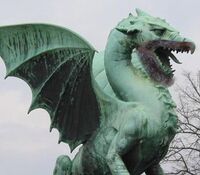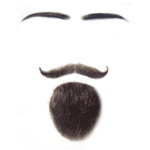Bearded dragon
| Pogona | ||||||||||||||||||
|---|---|---|---|---|---|---|---|---|---|---|---|---|---|---|---|---|---|---|
 Eastern Bearded Dragon (Pogona barbata)
| ||||||||||||||||||
| Scientific classification | ||||||||||||||||||
|
“We'll put a beard on a dragon and slap it into Monster Manual IV! Completely new monster!”
Bearded Dragons (Pogona barbata) are rare reptiles whose astonishing biological characteristic is their extremely long facial hair. Whereas most reptiles have short hair or none at all, many bearded dragons have stylish goatees. Bearded dragons are native to Australia and use their hirsutism for protection against the extreme temperatures in the bush country that human Australians refer to as the Wetback.
Several species of bearded dragons exist:
Russian bearded dragon[edit]
The Russian bearded dragon (P. longbeardus) is sometimes found in Russia, and sometimes found clerking at electronics flea markets around Boston. It is also known as the Boyar Dragon, as these dragons often grow their beards to great lengths, and leave them wild and tangled much as Boyars did in the times before Peter the Great.
Russian bearded dragons have among the worst breath weapons of all bearded dragons, its power only intensified by the dragons fearful need for vodka. Every forty years Russian bearded dragons will invade the territory of its neighbours, holding that territory for some time while inflicting its own social system, language and borscht. To understand the language of a Russian bearded dragon it is necessary to record its primitive grunting and play the recording backwards at half-speed. All confirm ed instances of this have resulted in the words "Bring me Gold", "I am hungry, bring me maidens" or "I wish to put the assets of the nation into the hands of the proletariat, please collectivise your farm."
Prismatic bearded dragon[edit]
The largest of the bearded dragons is the prismatic bearded dragon (P. holyshititsgonnakillus). These reptiles possess a breath weapon known as a beard-ray. Effects of the terrible gas include: frothing at the mouth, intense fevers, and excessive growth of body and facial hair, which may cause death. Due to this amazing power, it was hunted to near extinction by fearful Dungeons and Dragons characters during the late 1980s. Its population is still recovering from this over-hunting, and is currently considered an endangered species. WWF have placed the Prismatic bearded dragon in its "Red Book" of critically endangered animals but, uniquely, with a proviso that its breeding should be discouraged as its continuing non-extinct status is a threat to every other species on the planet
Related species[edit]
Taxonomically related to the bearded dragon is the bearded clam (P. meatus). This species also possesses a breath weapon, but rarely shoots lazors due to the risk of super-heating the seawater around it and turning itself into chowder. Its breath weapon is a significant threat to humans, but the threat is confined to several days of each lunar cycle when the clam is able to spit fire with particular intensity.
Defeating a bearded dragon[edit]
The most effective way to defeat any Bearded Dragon is to use the spell "Bigby's Scissor-Wielding Hand" to cut off its beard. A beardless bearded dragon immediately loses all its hit points, as famously also happened to Samson, although this sometimes just transforms it into a regular dragon. Regular dragons may be killed by shooting arrows into their soft under-belly, by exploiting its cold-blooded nature with a freeze-ray, rolling eight D20s, or by feeding it a surfeit of virgins.
| ||||||||||
| ||||||||

